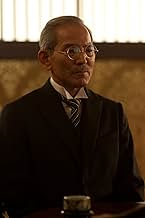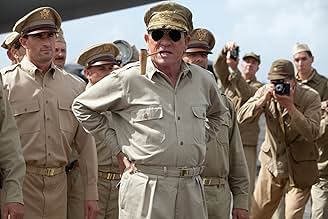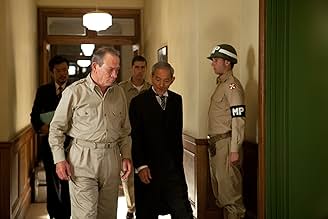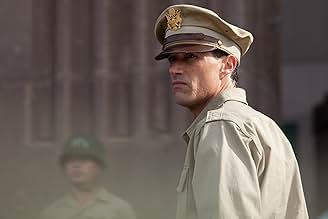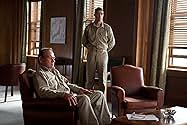अपनी भाषा में प्लॉट जोड़ेंAs the Japanese surrender at the end of World War II, General Fellers is tasked with deciding if Emperor Hirohito will be hanged as a war criminal. Influencing his ruling is his quest to fin... सभी पढ़ेंAs the Japanese surrender at the end of World War II, General Fellers is tasked with deciding if Emperor Hirohito will be hanged as a war criminal. Influencing his ruling is his quest to find Aya, an exchange student he met years earlier in the U.S.As the Japanese surrender at the end of World War II, General Fellers is tasked with deciding if Emperor Hirohito will be hanged as a war criminal. Influencing his ruling is his quest to find Aya, an exchange student he met years earlier in the U.S.
- पुरस्कार
- कुल 1 नामांकन
फ़ीचर्ड समीक्षाएं
In his rule over Japan as Supreme Commander of the occupying forces after World War II, General Douglas MacArthur was probably as benign a dictator as history has recorded. His enlightened policies led to a Japanese post war economic recovery from wartime devastation, and to post-war harmony between Japan and the West that replaced virulent wartime hatred. Emperor deals with his first days in Japan after the Japanese surrender, and in particular, with his momentous decision not to include the Emperor Hirohito among the Japanese war criminals, a judgement made despite political and popular clamor. Allied war propaganda had demonized the Japanese people and Hirohito in particular, and Japanese propaganda had done much the same with the other side. MacArthur's decision became the lynch-pin of his policy there: to respect the cultural differences instead of seeking to override them, and to try to bring together the best that both Japan and the western powers had to offer.
The movie deliberately avoids clarifying which emperor the title refers to. On the surface it may seem to denote Hirohito, but as supreme commander MacArthur had near imperial power, and did not hesitate to use it. The film concentrates on one of his protégés and close advisors, General Bonner Fellers, a Japanese expert on whose opinion MacArthur chooses to rely. Fellers was close to MacArthur, having served with him even before the war. Fellers loved Japan and had visited it, and had produced for the American military a crucial assessment of the Japanese military mind. He had additionally predicted war with Japan well in advance of Pearl Harbour. In real life, Fellers had some connections to Japan, even to the Imperial Household, and he had a close friendship with a former female Japanese exchange student whom he knew from Earlham College in Indiana. He rejoined MacArthur in 1943 and accompanied him during the Supreme Commander's momentous first days in Japan. The film strongly hints that MacArthur had already made up his mind about the treatment of Hirohito, which he almost certainly had, but wanted Fellers to supply the rationale for his decision.
The film has three threads that run throughout: MacArthur's occupation of Japan; Fellers' investigations leading to his written opinion; Fellers' search for his Japanese friend amidst the post-war chaos. It is one thread too many, since while the film juxtaposes these, it does not successfully weave them together. The one exception may be Fellers interview with the Japanese general, supposedly his friend's uncle, since it does much to explain the country's traditions and military attitudes. Director Peter Webber has said quite rightly that MacArthur has not been particularly successfully treated on the screen. In fact, epics like MacArthur (1977) and Inchon (1981) proved to be major disappointments. It seems a shame here that the director and writers Vera Blasi and David Klass did not keep MacArthur as the film's central figure, but instead chose to focus on his subordinate, Fellers.
As MacArthur, Tommy Lee Jones gives an outstanding performance, and the film is worth seeing for that alone. Looking nothing like MacArthur (he didn't try), Jones captures ever bit of "El Supremo's" command and self-confidence, and when he is present on screen, like the General himself, he dominates it. It is just a shame that he doesn't get more screen time. MacArthur is, historically, the man who made the real decisions, and, especially as played by Jones, a figure far more fascinating than Fellers.
By contrast, the part of Fellers (Matthew Fox of "Lost") seems dull, unfocused, and even clumsy, particularly considering the crucial days in which it is set. That is probably not Fox's fault, but a weakness of the screenplay. While the fact that Fellers knew Japan well and was especially friendly with a Japanese girl he had met in college are factors that deserve to enter into the picture, as presented they often tend to be a distraction from its central theme. This is all the more the case since the story of "Aya" appears to contain considerable fiction. Feller's real-life friend from Earlham, Yuri Wantanabe, survived the war, and his connections to Japanese officialdom were probably better than her own. There is the additional fiction that all this is compressed into a ten-day window, when the actual investigations took place over five months.
Still, in playing Aya, Eriko Hatsune renders her subtly, displaying a delicate balance between propriety and concern. Some of the other Japanese actors are equally notable. Especially fine, and especially central to the story, is the portrayal by Masatô Ibu of the Lord Privy Seal, Marquis Koichi Kibo, the highest figure in the Imperial Household and a friend to Hirohito. Ibu is persuasive in presenting a man who attempts to preserve the Emperor's honour – and his privacy – even in the face of the possibility that the Emperor might hang. Masayoshi Haneda also gives a fine performance as Fellers' interpreter and de facto aide. And Takatarô Kataoka is realistic as Emperor Hirohito himself.
The wanderings of the plot are offset in part by the great production values (Grant Major)and fine cinematography (by Stuart Dryburgh). The contrast between the real beauty of Japan and the wartime devastation is particularly effective.
This movie has many good things going for it, particularly Tommy Lee Jones (and MacArthur himself). It's just a pity it didn't capitalize on them more.
Emperor premiered at the Toronto International Film Festival on September 14, 2012. It has been acquired for distribution by Lionsgate & Roadside Attractions, but no date for general distribution has yet been announced.
Emperor concerns those fateful first days of the occupation when MacArthur made the decision not to try the Emperor or members of the royal family as war criminals. Doing the investigation on MacArthur's behalf was General Bonner Fellers who was an army intelligence officer with a background in Japanese language and culture. Matthew Fox is General Fellers and he's got another mission for himself, to find an exchange student from Japan from his youth and whom he knew up to the declaration of war between the USA and Japan.
Tommy Lee Jones plays MacArthur and while he doesn't have that majestic cultured voice that MacArthur had, he still creates a good impression of the imperious general who had a dislike of civil authority. In fact traces of the behavior that got him sacked by Harry Truman during the Korean War are shown. In this case though MacArthur with help of Fellers and his own knowledge of the Asian scene had the right instincts.
The Emperor of Japan centuries ago was a true ruler and over the centuries evolved into a constitutional monarch. But not the same as that Windsor family that reigns in the United Kingdom. The Japanese Shinto religion conferred divine status, the original emperor one Jimmu Tenno is supposed to be descended from the sun god. Japan's wars and foreign policy were done in his name, still are to some extent. A greater decision from Hirohito's part came when he said that he and his family were not divine.
Not covered in this film was the fact that Hirohito had some brothers, at least one of them would have been a more than willing tool of the army and navy chiefs who conducted Japan's war. He faced until the surrender the distinct possibility of being overthrown himself by one of his siblings.
Matthew Fox and Tommy Lee Jones and the Japanese cast are perfectly cast in their roles and I recommend this film as good entertainment and for those with an interest in the Far East.
This is a good drama war with emotion , suspense , thrills , culture clashes , and historical events . The picture contains a marvelous story of love and understanding set amidst the tensions and uncertainties of the days immediately following the Japanese surrender at the end of World War II. Excellent cast gives good acting as Fox who plays Bonner Fellers, a general who's sent to Japan to decide if Emperor Hirohito will be hanged for war crimes ; starring alongside him is Eriko Hatsune as Aya Shimada, a woman Fellers romanced years earlier, and Tommy Lee Jones as legendary Us military figure General Douglas MacArthur. The movie displays a colorful as well as adequate photography by Stuart Dryburgh . Emotive and evocative musical score by Alex Heffes . The flick was professionally directed by Peter Webber (Hannibal , The girl with a pearl earring). This true life story was one worthy of big-screen treatment .
The picture is well based on true events , these are the followings : After the war, Fellers played a major role in the occupation of Japan. Among his duties was liaison between HQ and the Imperial Household. Soon after occupation began, General Fellers wrote several influential memoranda concerning why it would be advantageous for the occupation, reconstruction of Japan, and U.S. long range interests to keep the Emperor in place if he was not clearly responsible for war crimes. He met with the major defendants of the Tokyo tribunal. In their research and analysis of events and considerable controversy about the time period, according to historians Herbert Bix and John W. Dower, Fellers—under an assignment by the code name "Operation Blacklist"—allowed them to coordinate their stories to exonerate Emperor Hirohito and all members of his family. This was at the direction of MacArthur, now head of SCAP, who had decided that there was to be no criminal prosecution of the Emperor and his family. He will question the accused Class -A War Criminals such as Wartime Prime Minister Hideki Tojo, Former Prime Minister Konoe, and Koichi Kido while confronting prejudice from a resentful populace and other American soldiers. General Fellers, who came from a Religious Society of Friends family (commonly known as Quakers) and attended the Quaker-affiliated Earlham College, was instrumental in the selection of Elizabeth Vining, an American Quaker educator, as tutor to the Emperor's children. Ms. Vining was followed after 4 years by another Quaker educator, Esther Rhoads.In 1971, Emperor Hirohito conferred on Fellers the Second Order of the Sacred Treasure "in recognition of your long-standing contribution to promoting friendship between Japan and the United States."
क्या आपको पता है
- ट्रिवियाThe romantic story between Fellers and Aya was entirely fictional for the film. Bonner F. Fellers was married in 1925 to Dorothy Dysart who accompanied him twice on his posting to the Phillipines, and she also went with him to China and Japan.
- गूफ़In the opening sequence the film makers use archival film showing an atom bomb being loaded into the bomb bay a B-29 for the attack on Hiroshima. The bomb shown is "Fat Man" and not "Little Boy" that was used on the attack on Hiroshima (8-6-1945). "Fat Man" was used in the second attack, three days later (8-9-1945) on Nagasaki.
- भाव
General Douglas MacArthur: I don't want the Communists in here. But Washington wants vengance on the emperor, because their voters do, and their voters have no fucking idea what's good for them.
टॉप पसंद
- How long is Emperor?Alexa द्वारा संचालित
विवरण
- रिलीज़ की तारीख़
- कंट्री ऑफ़ ओरिजिन
- आधिकारिक साइटें
- भाषाएं
- इस रूप में भी जाना जाता है
- Nhật Hoàng
- फ़िल्माने की जगहें
- उत्पादन कंपनियां
- IMDbPro पर और कंपनी क्रेडिट देखें
बॉक्स ऑफ़िस
- US और कनाडा में सकल
- $33,46,265
- US और कनाडा में पहले सप्ताह में कुल कमाई
- $10,14,099
- 10 मार्च 2013
- दुनिया भर में सकल
- $1,48,58,240
- चलने की अवधि1 घंटा 47 मिनट
- रंग
- ध्वनि मिश्रण
- पक्ष अनुपात
- 2.35 : 1
इस पेज में योगदान दें









